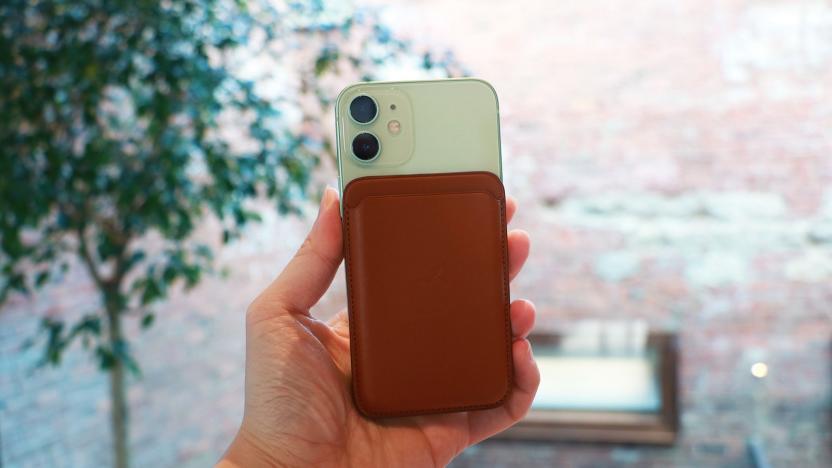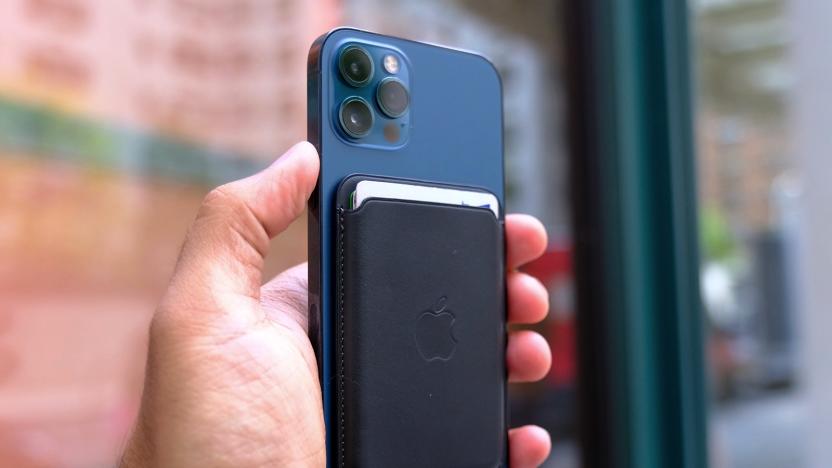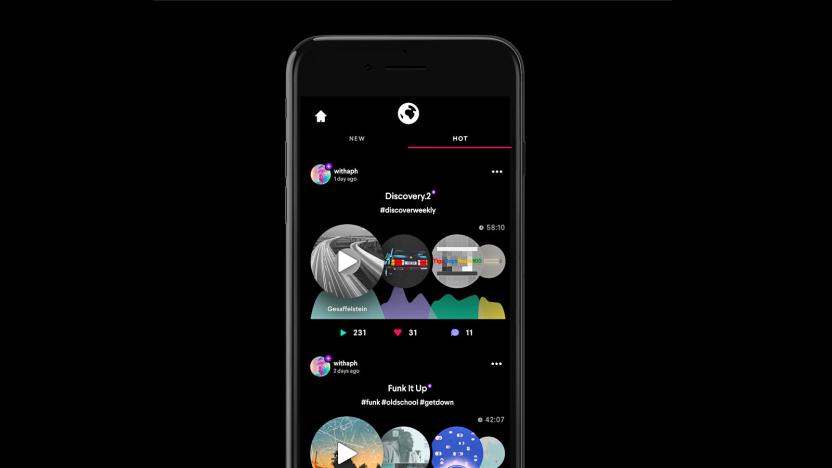pacemaker
Latest

Apple lists the devices you should keep away from your pacemaker
Apple has outlined the productsthat could interfere with pacemakers and other medical devices, and they include much more than just the iPhone 12.

American Heart Association says MagSafe could interfere with cardiac devices
Researchers suggest there’s a risk when Apple's iPhone 12 Pro Max is placed very close to pacemakers.

Apple warns against putting an iPhone 12 too close to your pacemaker
Apple has issued a warning that the iPhone 12 and MagSafe accessories might interfere with medical implants like pacemakers.

Self-charging pacemakers are powered by patients' heartbeats
Millions of people around the world depend on pacemakers, defibrillators and other life-saving implantable devices. The problem is, their batteries need to be replaced every five to ten years, requiring surgery that's not only expensive, but carries the risk of complications and infections. Now, though, a team of scientists are developing an implantable biomedical device that can be recharged with energy from cardiac activity.

Electric eels might be the key to powering implantable devices
Science has been inspired by eels for aquatic exploration before, sure, and now researchers are eyeing electric eels for motivation. The idea is to create a flexible self-powering device that could keep the juice flowing through a pacemaker or an internal medicine-delivery tool, without the need for a traditional battery pack.

FDA recalls close to half-a-million pacemakers over hacking fears
Turns out former Vice President (and erratic shooter) Dick Cheney was right all along: Your heart can be hacked. At least if you have a pacemaker, that is. On Tuesday, the FDA recalled 465,000 of the medical devices -- the ones that help control your heart beat -- citing security vulnerabilities. The pacemakers, which come from health company Abbott (formerly St. Jude Medical), require a firmware update. Fortunately, it can be installed by a health care provider in just three minutes. The models affected include the Accent, Anthem, Accent MRI, Accent ST, Assurity, and Allure.

Judge allows pacemaker data to be used in arson trial
Remember Ross Compton, that man from Ohio who was charged with aggravated arson and insurance fraud based on his pacemaker data? He and his lawyer tried to convince the court to disregard that evidence, arguing that it was obtained in an illegal search. Well, the judge that heard the case didn't see it that way: he has decided to allow the suspect's pacemaker results to be used as evidence against him in an upcoming trial.

Wireless pacemakers could make life easier for heart patients
Since its invention in 1932, the pacemaker has saved countless lives. Now, thanks to researchers at Rice University and the Texas Heart Institute, it looks like this essential medical device could be getting a pretty signifcant upgrade. In a bid to reduce costly and invasive operations, the aforementioned institutions have joined forces to create the world's first wireless and battery-less pacemaker. Powered purely by microwaves, this new pacemaker is smaller than a dime, allowing it to be implanted directly into a patient's heart. Doing away with the wires that usually power pacemakers, this new device takes its energy from radio waves emitted by an external battery pack.

Pacemakers are far more vulnerable to hacking than we thought
Back in January, the FDA has finally acknowledged that some pacemakers and other cardiac devices are vulnerable to hacking. But how vulnerable are they, exactly? A security company called WhiteScope has discovered 8,000 bugs that hackers can exploit in pacemaker programmers -- the tools used to adjust and monitor the device itself -- from four different manufacturers. More importantly, the researchers said they've also discovered that pacemakers don't authenticate programmers, so any working tool listed on eBay has the potential to harm patients with the implant.

Turns out, pacemaker security is terrifying
The hacker who uses her wizard powers to get rich by manipulating stocks is a tired Hollywood trope. But that doesn't mean some hackers don't dream about making the fantasy come true, or that the ridiculous vulnerabilities necessary to facilitate such a thing don't exist. Some hackers do indeed have that dream. And reductive Hollywood-style vulns in critical financial (and other) systems are as real as they are plentiful in our world of crap security.

Pacemaker+ makes your mixes better and easier to share
In news that'll please budding mix-meisters (you're not actually a DJ, sorry), popular iOS mixing app Pacemaker has just received a hefty paid update. Pacemaker+ doubles down on its existing social features, allowing users to seamlessly create and share their mixtapes using their Spotify Premium library. With over 30 million tracks at their fingertips, owners of the premium in-app upgrade will also have access to new mixing tools courtesy of Pacemaker+'s Studio features.

Man's pacemaker data leads to arson and insurance fraud charges
Authorities from Ohio arrested a man named Ross Compton and charged him with arson and insurance fraud based on his pacemaker data. Compton told the police that when he saw his house burning on September 19th last year, he packed his suitcases, threw them out his bedroom window and carried them to his car. However, since has a serious heart condition and other medical issues that would have made it extremely difficult for him to do all those, the cops were able to secure a search warrant for his pacemaker data.

The way to a man's heart is actually through WiFi
They say you can't hide what's in your heart, but the saying is doubly true for an Ohio man whose pacemaker data has been used to indict him on felony charges of aggravated arson and insurance fraud.

FDA warns that certain pacemakers are vulnerable to hacking
According to a cybersecurity notice from the Food and Drug Administration, certain pacemakers and cardiac devices are currently vulnerable to hacking. Although security researchers have warned about the security risks to medical devices for years now, this is the first time we've seen the government publicly acknowledge a specific threat.

Pacemaker's shareable, editable 'mixtapes' make everyone a DJ
Ever since the original Pacemaker DJ device in 2008, the Swedish team has been rethinking how we mix music. Today, Pacemaker's iOS app gets an overhaul that drags the mixtape well and truly into 2016. Pacemaker had long since moved on from being a facsimile of the DJ booth, instead allowing all music lovers to pick tunes from Spotify, and create seamless playlists stitched together by the app's in-house AI DJ "Mållgan." Today Pacemaker expands on that with a bunch of social features that blend elements of Soundcloud and Spotify with, of course, a little DJ twist.

FDA approves 'world's smallest' pacemaker for heart patients
As consumer technology has trended smaller and thinner, medical devices have done the same. And now, the first transcatheter pacemaker has been approved for use with heart patients in the US. Medtronic gained FDA approval for its Micra TPS pacemaker, the first device to employ the miniaturized pacing tech to be approved by the US government. The company is calling the device the "world's smallest pacemaker," measuring just a tenth of the size of traditional technology. It's about the size of large vitamin.

Pacemaker's DJ app is putting the 'mix' back into mixtape
The team that gave the world the Pacemaker portable DJ device, the Pacemaker DJ app, and put the whole Spotify library in your virtual record box doesn't want you to DJ anymore. In fact, the latest version of Pacemaker for iPhone almost elbows you out of the DJ booth completely, assigning you the role of "selecta" instead, while it blends the music. Pacemaker isn't the first app to auto mix your tunes (it's not even the first one this week). It's not even the first Pacemaker app to do so. What this update does do, is have a stab at reinventing the humble playlist -- turning them into seamless beat-matched mixes that you control.

Researchers control fruit flies' hearts with a laser
Scientists have directly controlled animals before, but these approaches tend to either require surgery or only work with critters at certain stages in their lives. Researchers might have a more powerful technique in store, however: they've managed to control fruit flies' heartbeats through laser pulses. The approach relies on optogenetics, or modifying the genes of animals to produce materials that respond to light. In this case, the team tweaked flies' heart cells to produce light-sensitive proteins. After that, it was just a matter of zapping the hearts to make them beat on command, whether the flies were larvae or full-grown insects.

Future pacemakers might be completely biological
It's pretty amazing that humanity has invented a small electrical device that can be used to ensure a heart keeps a steady beat, but pacemakers have to be maintained, replaced -- sometimes they can even become infected. Researchers say they're working on a less invasive solution: a "biological pacemaker." It's a form of gene therapy that implants the heart with a gene-carrying virus that creates a "sino-atrail node," a collection of neurons that acts as a natural metronome for the body's most important muscle.

Scientists make deep-brain implants possible through wireless charging
Stanford researchers have figured out a way to wirelessly charge electronic devices that are deep inside your body. Currently pacemakers and nerve transmitters need to have large receiving coils near the top of your skin to charge up (limiting where you can put them), or periodically have their battery replaced through surgery. This new method, however, would allow devices to be much smaller because they don't have to tote around such a huge battery. Also since they're not reliant on charging coils they could live much deeper in the body and brain.











